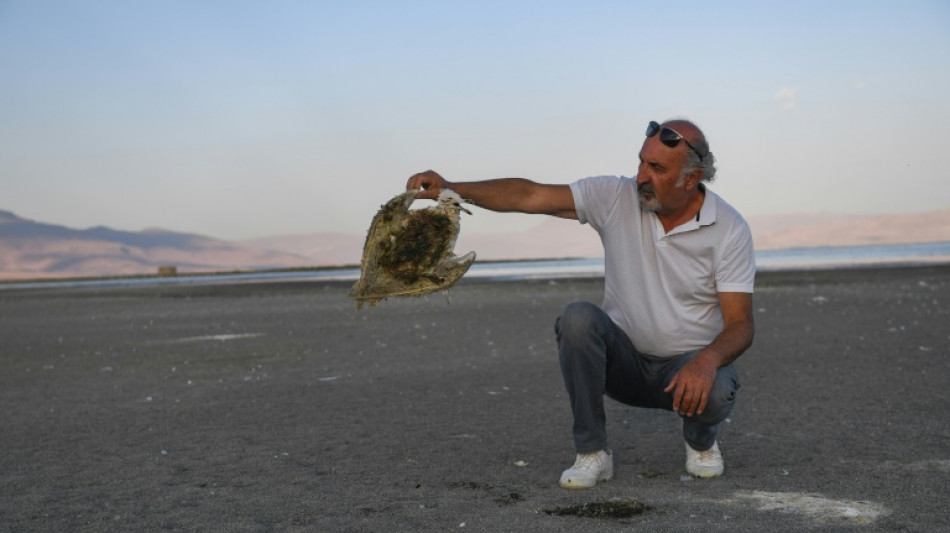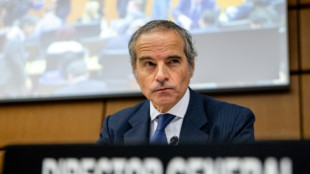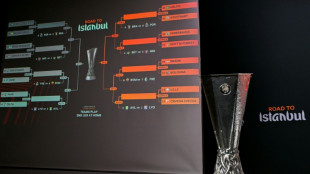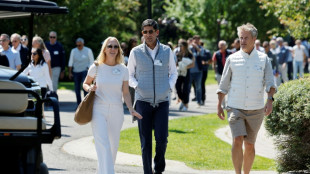
-
 Kremlin says agreed to halt strikes on Kyiv until Sunday
Kremlin says agreed to halt strikes on Kyiv until Sunday
-
Carrick calls for calm after flying start to Man Utd reign

-
 Djokovic to meet Alcaraz in Melbourne final after five-set marathon
Djokovic to meet Alcaraz in Melbourne final after five-set marathon
-
Italian officials to testify in trial over deadly migrant shipwreck

-
 Iran says defence capabilities 'never' up for negotiation
Iran says defence capabilities 'never' up for negotiation
-
UN appeals for more support for flood-hit Mozambicans

-
 Lijnders urges Man City to pile pressure on Arsenal in title race
Lijnders urges Man City to pile pressure on Arsenal in title race
-
Fulham sign Man City winger Oscar Bobb

-
 Strasbourg's Argentine striker Panichelli sets sights on PSG, World Cup
Strasbourg's Argentine striker Panichelli sets sights on PSG, World Cup
-
Jesus 'made love': Colombian president irks Christians with steamy claim

-
 IAEA board meets over Ukraine nuclear safety concerns
IAEA board meets over Ukraine nuclear safety concerns
-
Eurozone growth beats 2025 forecasts despite Trump woes

-
 Dutch PM-elect Jetten says not yet time to talk to Putin
Dutch PM-elect Jetten says not yet time to talk to Putin
-
Social media fuels surge in UK men seeking testosterone jabs

-
 Forest face Fenerbahce, Celtic draw Stuttgart in Europa League play-offs
Forest face Fenerbahce, Celtic draw Stuttgart in Europa League play-offs
-
US speed queen Vonn crashes at Crans-Montana, one week before Olympics

-
 Trump nominates former US Fed official as next central bank chief
Trump nominates former US Fed official as next central bank chief
-
New Dutch government pledges ongoing Ukraine support

-
 Newcastle still coping with fallout from Isak exit, says Howe
Newcastle still coping with fallout from Isak exit, says Howe
-
Chad, France eye economic cooperation as they reset strained ties

-
 Real Madrid to play Benfica, PSG face Monaco in Champions League play-offs
Real Madrid to play Benfica, PSG face Monaco in Champions League play-offs
-
Everton winger Grealish set to miss rest of season in World Cup blow

-
 Trump brands Minneapolis nurse killed by federal agents an 'agitator'
Trump brands Minneapolis nurse killed by federal agents an 'agitator'
-
Arteta focuses on the positives despite Arsenal stumble

-
 Fijian Drua sign France international back Vakatawa
Fijian Drua sign France international back Vakatawa
-
Kevin Warsh, a former Fed 'hawk' now in tune with Trump

-
 Zverev rails at Alcaraz timeout in 'one of the best battles ever'
Zverev rails at Alcaraz timeout in 'one of the best battles ever'
-
Turkey leads Iran diplomatic push as Trump softens strike threat

-
 Zelensky backs energy ceasefire, Russia bombs Ukraine despite Trump intervention
Zelensky backs energy ceasefire, Russia bombs Ukraine despite Trump intervention
-
'Superman' Li Ka-shing, Hong Kong billionaire behind Panama ports deal

-
 Skiing great Lindsey Vonn crashes at Crans-Montana, one week before Olympics
Skiing great Lindsey Vonn crashes at Crans-Montana, one week before Olympics
-
Slot warns Liverpool 'can't afford mistakes' in top-four scrap

-
 Paris show by late Martin Parr views his photos through political lens
Paris show by late Martin Parr views his photos through political lens
-
Artist chains up thrashing robot dog to expose AI fears

-
 Alcaraz outlasts Zverev in epic to reach maiden Australian Open final
Alcaraz outlasts Zverev in epic to reach maiden Australian Open final
-
French PM forces final budget through parliament

-
 French-Nigerian artists team up to craft future hits
French-Nigerian artists team up to craft future hits
-
Dutch watchdog launches Roblox probe over 'risks to children'

-
 Trump brands Minneapolis nurse shot dead by federal agents an 'agitator'
Trump brands Minneapolis nurse shot dead by federal agents an 'agitator'
-
Israel says killed 'three terrorists' in Gaza

-
 After Trump-fueled brawls, Canada-US renew Olympic hockey rivalry
After Trump-fueled brawls, Canada-US renew Olympic hockey rivalry
-
Eileen Gu - Olympic champion who bestrides rivals US, China

-
 Trump, first lady attend premier of multimillion-dollar 'Melania' documentary
Trump, first lady attend premier of multimillion-dollar 'Melania' documentary
-
US Senate eyes funding deal vote as government shutdown looms

-
 Cuddly Olympics mascot facing life or death struggle in the wild
Cuddly Olympics mascot facing life or death struggle in the wild
-
UK schoolgirl game character Amelia co-opted by far-right

-
 Anger as bid to ramp up Malaysia's football fortunes backfires
Anger as bid to ramp up Malaysia's football fortunes backfires
-
Panama court annuls Hong Kong firm's canal port concession

-
 Pioneer African Olympic skier returns to Sarajevo slopes for documentary
Pioneer African Olympic skier returns to Sarajevo slopes for documentary
-
Trump threatens tariffs on nations selling oil to Cuba

| VOD | -0.17% | 14.685 | $ | |
| RYCEF | -2.69% | 16 | $ | |
| RELX | -0.81% | 35.875 | $ | |
| CMSC | -0.21% | 23.645 | $ | |
| BTI | -0.13% | 60.13 | $ | |
| NGG | -0.1% | 84.965 | $ | |
| RIO | -2.64% | 92.68 | $ | |
| AZN | 0.39% | 92.95 | $ | |
| GSK | 1.21% | 51.275 | $ | |
| RBGPF | 1.65% | 83.78 | $ | |
| CMSD | 0.17% | 24.1 | $ | |
| JRI | 0.27% | 12.99 | $ | |
| BP | 0.42% | 38.2 | $ | |
| SCS | 0.12% | 16.14 | $ | |
| BCC | -1.57% | 78.93 | $ | |
| BCE | 0.14% | 25.52 | $ |

'Animals are thirsty': Dust and bones on Turkey's shrinking lake
Shepherd Ibrahim Koc recalls his youth with fondness as he grazes cattle on a barren field that was once lush with vegetation on the edge of Turkey's largest lake.
An occasional shrub marks the spots from where Lake Van has retreated over years of global heating and drought.
"The animals are thirsty," the 65-year-old lamented.
"There is no water," Koc said, echoing sentiments expressed by a growing number of Turks who have watched their mountains lose ice caps and their water reservoirs dry up.
A weather map of Turkey -- an agricultural superpower stretching from Bulgaria in the west to Iran in the east -- shows much of the country suffering from a prolonged drought.
Shrinking shorelines are exposing lakebeds that pollute the air with a salty dust. Scientists fear the problems could grow only worse.
"I think these are our good days," Faruk Alaeddinoglu, a professor at Van Yuzuncu Yil University, told AFP.
"We will witness the lake continuing to shrink in the coming years."
Lake Van covers approximately 3,700 square kilometres (1,400 square miles), reaching a maximum depth of 450 metres (1,475 feet).
Its surface area has shrunk by around 1.5 percent in recent years, according to measurements Alaeddinoglu carried out last autumn.
"That is a terribly large amount of water for a 3,700 square kilometre area," he said.
- 'Barren land'-
In the Celebibagi neighbourhood on the lake's northern shore, the waters have receded by around four kilometres.
A long walk along the exposed lakebed is littered with bird bones, craggy bushes and dried dirt covered with sodium and other minerals.
"We are walking in an area which was once covered with the lake's waters," said Ali Kalcik, a local environmentalist.
"Now, it's a barren land without a living thing."
The sight of dazzling flamingos dancing in the air against the backdrop of mountains signals the spot where the lake finally begins.
Alaeddinoglu said the lake's size had changed in the past because of rifts in tectonic plates that make Turkey into one of the most active earthquake zones in the world.
But he blamed the ongoing water loss on rising temperatures that result in "less precipitation and excessive evaporation".
Almost three times as much of the lake's water evaporates than comes back down in the form of rain, Alaeddinoglu said.
Lush gardens of newly-built summer cottages are also draining water from the region, where President Recep Tayyip Erdogan has built a government retreat.
- 'Business is dying' -
The problem has become so severe that officials are urging local farmers not to grow crops requiring too much water.
This means farmer Kinyas Gezer can no longer afford to grow sugar beets, which are a particularly thirsty vegetable.
"All my labour has been wasted," the 56-year-old lamented, pointing to his shrivelled apricots.
"If it goes on like this, we will abandon farming. The business is dying."
The water's loss also exposes pollution, according to Orhan Deniz, a professor of Yuzuncu Yil University, whose campus sits on the lake's shore.
"Large patches of slime mixed with mud give off a bad smell and make human pollution more evident," he said.
"In the 1990s, we would swim during lunch break and then go back to university," he said, gazing at the lake from his office.
"Now it's not possible to step in the water, let alone swim in it," he said.
- 'A bird massacre' -
The lake is still popular with tourists and some locals swim along its more scenic parts.
Van Governor Ozan Balci said his office has spent 80 million lira ($3 million) cleaning up the lake.
"We are doing our best to protect the lake because of its cultural heritage and people's common memory," he told AFP.
In the shoreline village of Adir, some locals swam and others picnicked under a tree.
But dead gulls lying not too far from the vacationers betrayed the ecological problems facing the lake.
Experts say pearl mullets that form the basis of the gulls' diet migrated early this year because of the drought.
Deprived of food, the gulls simply starved to death.
"The remaining birds here have one more week. Then they will also die," local villager Necmettin Nebioglu, 64, said.
"In the past, the seagulls would follow us while we were swimming. Now look, it's a bird massacre," he said, pointing to a pile of carcasses on the shore.
G.Schulte--BTB



